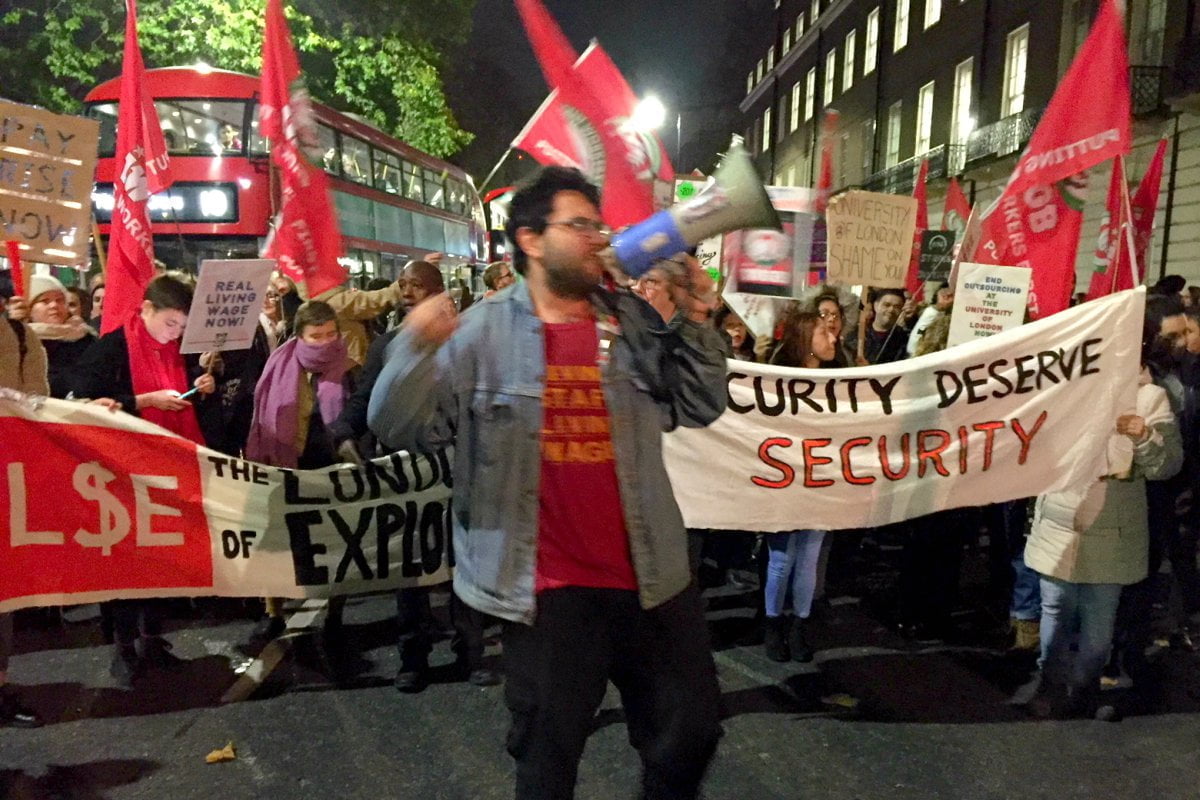SOAS Marxist students report from the protest earlier this week called by the Independent Workers of Great Britain (IWGB) University of London branch in support of bringing outsourced workers at the Senate House back in-house.
On Tuesday 21st November, SOAS Marxist society and Socialist Appeal supporters, along with several hundred other demonstrators, attended the protest called by the Independent Workers of Great Britain (IWGB) University of London branch in support of bringing outsourced workers at the Senate House back in-house.
The demonstration was lively and dynamic, with music and drums, a sea of red flags and home-made placards, and a fast-paced march around the Senate House building that stopped traffic in its tracks.
The event coincided with the annual visit from the Chancellor of Senate House – Princess Anne. At a time of huge inequality and desperate conditions throughout society, it seemed fitting that the workers were taking militant action against not only their bosses, but also Princess Anne and the decrepit and pointless institution that she represents.
Bring them back in-house!
The IWGB were striking in protest of the outsourcing of workers in Senate House, along with the conditions of precarious work and low pay that this generates. This strike is but one in a line of planned strikes and events that the IWGB have organised to fight outsourcing, with future demos and petitions scheduled as part of the ‘Back in House’ campaign that was launched a few months ago.
The University of London have now announced a review of the terms and conditions of the outsourced worker’s contracts, with the union taking this as an opportunity to put pressure on the University.
We spoke to Jason Moyer-Lee, General Secretary of the IWGB:
“We’ll do protests, we’ll do strikes. Today we launched a legal challenge related to outsourcing, so we think it’s just a matter of time before they cave…
“The first wave [of actions] was about the living wage, where lots of dominoes fell; the second wave was about sick pay and holidays and pensions – a number of universities fell then. Now outsourcing is the last one. SOAS fell; LSE fell; and University of London is next.”
The mention of a legal challenge is in reference to a potentially landmark case, in which the union are fighting for the right of all outsourced workers to be able to negotiate their pay and conditions with the institution that employs them. If successful, this could prove to revolutionise the progress made in fighting for the rights of outsourced workers.
The logic of exploitation
 The outsourcing of these workers sees them employed by agencies that provide them with contracts that have terrible terms and conditions. These often lead to workers suffering from discrimination, bullying, and harassment as they do not receive the same rights as staff employed directly from the university. Members of staff that are already in-house tend to be white British, while the outsourced workers are typically migrants and people of colour, once again displaying the unashamed systematic discrimination within these institutions.
The outsourcing of these workers sees them employed by agencies that provide them with contracts that have terrible terms and conditions. These often lead to workers suffering from discrimination, bullying, and harassment as they do not receive the same rights as staff employed directly from the university. Members of staff that are already in-house tend to be white British, while the outsourced workers are typically migrants and people of colour, once again displaying the unashamed systematic discrimination within these institutions.
What is the logic of outsourcing? Simply put, management are seeking to cut costs by any means necessary. Capitalist firms, meanwhile, are looking to make a profit from higher education institutions. To end this exploitation, we must tackle the root of the problem. Capitalism is in a period of unprecedented crisis, and the working class are being forced to pay for it.
Katherine, an Uber driver who attended the demonstration in solidarity with university staff, eloquently summarised this view:
“What is clear to me, is that we are living in a society more divided than ever. Where are the opportunities for us? I’ve come here to support this struggle because we are being made to pay for a financial crash that wasn’t our fault. This needs to stop.”
This series of campaigns involving university workers has highlighted the importance of students and workers uniting and fighting together in order to achieve our goals. This fight is everyone’s fight. By linking all these struggles within the wider class struggle we can fight to end to this exploitation






